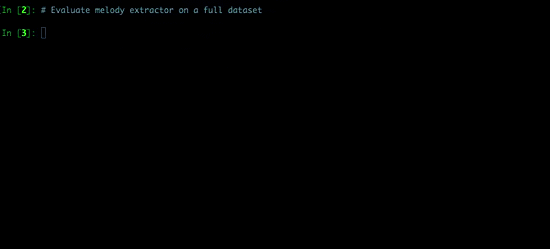common loaders for Music Information Retrieval (MIR) datasets. Find the API documentation here.
This library provides tools for working with common MIR datasets, including tools for:
- downloading datasets to a common location and format
- validating that the files for a dataset are all present
- loading annotation files to a common format, consistent with the format required by mir_eval
- parsing track level metadata for detailed evaluations
- Beatles
- DALI
- Groove MIDI
- GTZAN genre
- GuitarSet
- Ikala
- MedleyDB Melody
- MedleyDB Pitch
- Medley-solos-DB
- ORCHSET
- RWC Classical
- RWC Jazz
- RWC Popular
- Salami
- TinySOL
For more information about these datasets see this table.
To install, simply run:
pip install mirdataThis library was presented in the following paper:
"mirdata: Software for Reproducible Usage of Datasets"
Rachel M. Bittner, Magdalena Fuentes, David Rubinstein, Andreas Jansson, Keunwoo Choi, and Thor Kell
in International Society for Music Information Retrieval (ISMIR) Conference, 2019
@inproceedings{
bittner_fuentes_2019,
title={mirdata: Software for Reproducible Usage of Datasets},
author={Bittner, Rachel M and Fuentes, Magdalena and Rubinstein, David and Jansson, Andreas and Choi, Keunwoo and Kell, Thor},
booktitle={International Society for Music Information Retrieval (ISMIR) Conference},
year={2019}
}
To add datasets and code, please see CONTRIBUTING.md
import mirdata.orchset
mirdata.orchset.download()import mirdata.orchset
mirdata.orchset.validate()import mirdata.orchset
orchset_data = mirdata.orchset.load()import mirdata.orchset
orchset_ids = mirdata.orchset.track_ids()
orchset_data = mirdata.orchset.load()
example_track = orchset_data[orchset_ids[0]]
print(example_track)
> orchset.Track(
track_id='Beethoven-S3-I-ex1',
melody=F0Data(times=array([0.000e+00, 1.000e-02, 2.000e-02, ..., 1.244e+01, 1.245e+01, 1.246e+01]),
frequencies=array([ 0. , 0. , 0. , ..., 391.995, 391.995, 391.995]),
confidence=array([0, 0, 0, ..., 1, 1, 1])),
audio_path_mono='~/mir_datasets/Orchset/audio/mono/Beethoven-S3-I-ex1.wav',
audio_path_stereo='~/mir_datasets/Orchset/audio/stereo/Beethoven-S3-I-ex1.wav',
composer='Beethoven',
work='S3-I',
excerpt='1',
predominant_melodic_instruments=['winds', 'strings'],
alternating_melody=True,
contains_winds=True,
contains_strings=True,
contains_brass=False,
only_strings=False,
only_winds=False,
only_brass=False
)import mir_eval
import mirdata.orchset
import numpy as np
import sox
def very_bad_melody_extractor(audio_path):
duration = sox.file_info.duration(audio_path)
time_stamps = np.arange(0, duration, 0.01)
melody_f0 = np.random.uniform(low=80.0, high=800.0, size=time_stamps.shape)
return time_stamps, melody_f0
# Evaluate on the full dataset
orchset_scores = {}
orchset_data = mirdata.orchset.load()
for track_id, track_data in orchset_data.items():
est_times, est_freqs = very_bad_melody_extractor(track_data.audio_path_mono)
ref_melody_data = track_data.melody
ref_times = ref_melody_data.times
ref_freqs = ref_melody_data.frequencies
score = mir_eval.melody.evaluate(ref_times, ref_freqs, est_times, est_freqs)
orchset_scores[track_id] = score
# Split the results by composer and by instrumentation
composer_scores = {}
strings_no_strings_scores = {True: {}, False: {}}
for track_id, track_data in orchset_data.items():
if track_data.composer not in composer_scores.keys():
composer_scores[track_data.composer] = {}
composer_scores[track_data.composer][track_id] = orchset_scores[track_id]
strings_no_strings_scores[track_data.contains_strings][track_id] = \
orchset_scores[track_id]By default, all datasets tracked by this library are stored in ~/mir_datasets,
(defined as MIR_DATASETS_DIR in mirdata/__init__.py).
Data can alternatively be stored in another location by specifying data_home
within a relevant function, e.g. mirdata.orchset.download(data_home='my_custom_path')

